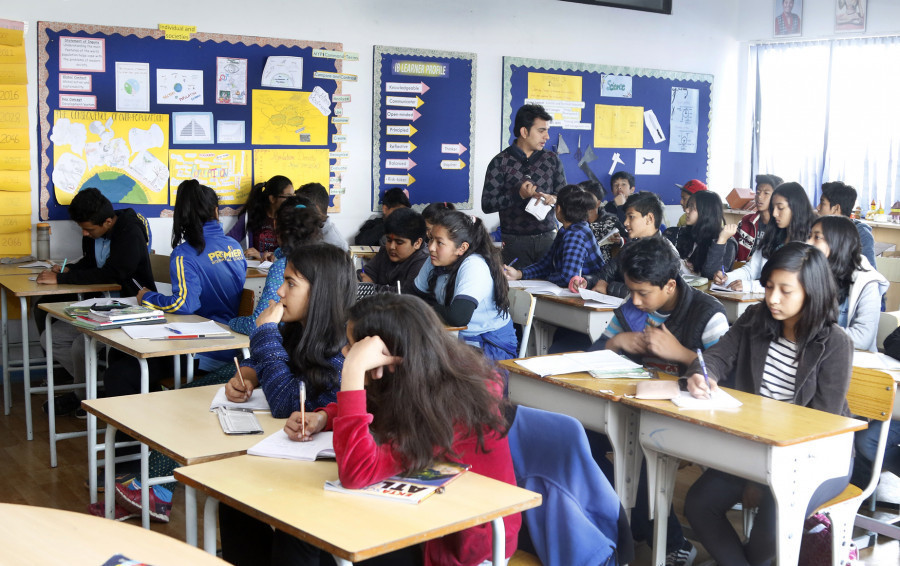National
Private school ownership major contention in school education bill
As most MPs want them to become trusts, officials remind lawmakers of constitutional space for private institutions.
Post Report
While most lawmakers are for converting private schools into trusts, government officials have urged them to be mindful of constitutional protection for the private sector.
The school education bill, under discussion in the Education and Health and Information Technology Committee of the House of Representatives, has attracted amendments from 152 lawmakers. Many of the proposals are related to a change in the ownership modality of the privately operated schools. Most lawmakers have registered amendments to the bill to convert such schools into trusts, even though there are vast differences in the proposed time frames.
Lawmakers from the Nepali Congress, the CPN-UML and the CPN (Maoist Centre) have proposed converting them into trusts in 10 years. But the Rastriya Swatantra Party is for giving the schools 20 years to do so, even as the Nepal Majdoor Kishan party wants to convert them into trusts in five years.
Officials at the Ministry of Education, Science and Technology, however, say everyone should consider that Nepal embraces a three-pillar economic model—with the government, cooperatives and the private sector as actors—where private schools have an important place.
“Our focus should be on monitoring private schools [not changing their ownership],” said Suresh Adhikari, secretary at the ministry, at the House committee on Sunday. “The discussion’s priority should be for increasing scholarships and controlling the monopoly in fixing the fee structure.”
In August, the Pushpa Kamal Dahal-led Cabinet approved the bill with a provision for converting private schools into trusts. Clause 4 (3) of the bill made the conversion of the private schools registered under the Company Act into trusts mandatory within five years. The government defended the provision as a measure proposed to stop over-commercialisation of school education.
The government backtracked on the decision following strong objections from the umbrella bodies of private school operators. When the bill was registered in Parliament in September, the provision was missing. The bill under discussion leaves it to the existing private schools whether to convert into trusts.
Creating hurdles for new entrants in the private education sector, the bill says they must first be registered as trusts. Educationists have criticised it, arguing that the provision would curb competition. Through amendment proposals, cross-party lawmakers say the same rule should apply to all schools, no matter when they are registered.
The High-level Education Commission in 2019 had recommended converting private schools into trusts within 10 years. It, however, was never made public by the government of the day, led by KP Sharma Oli.
“There are several flaws in the bill. It, therefore, needs to be rewritten,” said Toshima Karki, a Rastriya Swatantra Party lawmaker, during deliberations in the House committee. “Amendments alone are not enough.”
Following criticism of the bill, the House committee has decided to consult the stakeholders and in the provinces as well, if necessary.
The bill gives local units full authority to establish and operate schools. They, however, will have to put together the resources to manage and operate them. The authority to decide on school mergers, upgrades, downgrades and relocation will also be with local units. On the one hand, the bill empowers local units as envisioned in the constitution, but by proposing to revive the district-level education offices, the federal government has shown an unwillingness to give up power easily.
The 2015 constitution institutionalised federalism and ended the existence of districts as administrative units. With it, the education offices were reduced to education units. Several amendments have been registered to scrap the provisions relating to reviving the district-level education offices.
If the bill gets endorsed, the national-level board exams will be conducted only at the end of grade 12. It is silent on the Secondary Education Examinations that used to be held at the end of grade 10, which means respective schools will conduct the tests. The National Examination Board will hold grade 12 tests across the country.
The local units will conduct grade 8 tests. However, education offices in the respective districts will prepare question sets for compulsory subjects; the local units will prepare questions only for optional subjects. The previous bill allowed the provincial boards to conduct grade 10 tests. The new bill doesn’t give any role to the provinces in examination management.
Education experts also point to several flaws in the current bill including the ownership modality of the private schools, which need to be rectified. Binaya Kusiyait, professor at Tribhuvan University, said the constitution envisions free school education. Letting private schools continue to charge exorbitant fees goes against the statute’s spirit.
“I agree that turning schools into trusts can control over-commercialisation in the education sector,” Kusiyait told the Post. “But I doubt if Parliament will pass such a provision.”




 13.12°C Kathmandu
13.12°C Kathmandu













